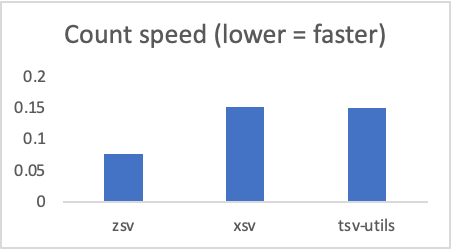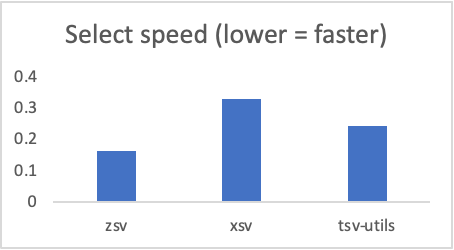zsv+lib is a fast CSV parser library and extensible command-line utility. It achieves high performance using SIMD operations, efficient memory use and other optimization techniques, and can also parse generic-delimited and fixed-width formats, as well as multi-row-span headers
The ZSV CLI can be compiled to virtually any target, including
WebAssembly, and offers features including select, count,
direct CSV sql, flatten, serialize, 2json conversion, 2db sqlite3
conversion, stack, pretty, 2tsv, compare, paste, overwrite and more.
The ZSV CLI also includes sheet, an in-console interactive grid viewer (TO DO:
that can be extended with your custom code for manipulating and) for viewing
data:

Pre-built CLI packages are available via brew and nuget.
A pre-built library package is available for Node (npm install zsv-lib).
Please note, this package is still in alpha and currently only exposes a small
subset of the zsv library capabilities. More to come.
If you like zsv+lib, do not forget to give it a star! 🌟
Preliminary performance results compare favorably vs other CSV utilities (xsv,
tsv-utils, csvkit, mlr (miller) etc). Below were results on a pre-M1 macOS
MBA; on most platforms zsvlib was 2x faster, though in some cases the advantage
was smaller e.g. 15-25%) (below, mlr not shown as it was about 25x slower):
** See 12/19 update re M1 processor at https://github.com/liquidaty/zsv/blob/main/app/benchmark/README.md
"CSV" is an ambiguous term. This library uses the same definition as Excel. In
addition, it provides a row-level (as well as cell-level) API and provides
"normalized" CSV output (e.g. input of this"iscell1,"thisis,"cell2 becomes
"this""iscell1","thisis,cell2"). Each of these three objectives (Excel
compatibility, row-level API and normalized output) has a measurable performance
impact; conversely, it is possible to achieve-- which a number of other CSV
parsers do-- much faster parsing speeds if any of these requirements (especially
Excel compatibility) are dropped.
zsv is an extensible CSV utility, which uses zsvlib, for tasks such as slicing
and dicing, querying with SQL, combining, serializing, flattening,
converting between CSV/JSON/sqlite3 and more.
zsv is streamlined for easy development of custom dynamic extensions.
zsvlib and zsv are written in C, but since zsvlib is a library, and zsv
extensions are just shared libraries, you can extend zsv with your own code in
any programming language, so long as it has been compiled into a shared library
that implements the expected
interface.
- Available as BOTH a library and an application (coming soon: standalone zsvutil library for common helper functions such as csv writer)
- Open-source, permissively licensed
- Handles real-world CSV the same way that spreadsheet programs do (including edge cases). Gracefully handles (and can "clean") real-world data that may be "dirty".
- Runs on macOS (tested on clang/gcc), Linux (gcc), Windows (mingw), BSD (gcc-only) and in-browser (emscripten/wasm)
- Fastest (at least, vs all alternatives and on all platforms we've benchmarked where 256-bit SIMD operations are available). See app/benchmark/README.md
- Low memory usage (regardless of how big your data is) and size footprint for both lib (~20k) and CLI executable (< 1MB)
- Handles general delimited data (e.g. pipe-delimited) and fixed-with input (with specified widths or auto-detected widths)
- Handles multi-row headers
- Handles input from any stream, including caller-defined streams accessed via a
single caller-defined
fread-like function - Easy to use as a library in a few lines of code, via either pull or push parsing
- Includes the
zsvCLI with the following built-in commands:sheet, an in-console interactive and extendable grid viewerselect,count,sqlquery,describe,flatten,serialize,2json,2db,stack,pretty,2tsv,paste,compare,overwrite,jq,prop,rm- easily convert between CSV/JSON/sqlite3
- compare multiple files
- CLI is easy to extend/customize with a few lines of code via modular plug-in framework. Just write a few custom functions and compile into a distributable DLL that any existing zsv installation can use.
Download pre-built binaries and packages for macOS, Windows, Linux and BSD from the Releases page.
You can also download pre-built binaries and packages from Actions for the latest commits and PRs but these are retained only for limited days.
Important
For musl libc static build, the dynamic extensions are not supported!
Note
After v0.3.9-alpha, all package artifacts will be properly
attested.
To verify, you can use GitHub CLI like this:
gh attestation verify <downloaded-artifact> --repo liquidaty/zsv...via Homebrew:
brew tap liquidaty/zsv
brew install zsv...via MacPorts:
sudo port install zsvFor Linux (Debian/Ubuntu - *.deb):
# Install
sudo apt install ./zsv-amd64-linux-gcc.deb
# Uninstall
sudo apt remove zsvFor Linux (RHEL/CentOS - *.rpm):
# Install
sudo yum install ./zsv-amd64-linux-gcc.rpm
# Uninstall
sudo yum remove zsvFor Windows (*.nupkg), install with nuget.exe:
# Install via nuget custom feed (requires absolutes paths)
md nuget-feed
nuget.exe add zsv .\<path>\zsv-amd64-windows-mingw.nupkg -source <path>/nuget-feed
nuget.exe install zsv -version <version> -source <path>/nuget-feed
# Uninstall
nuget.exe delete zsv <version> -source <path>/nuget-feedFor Windows (*.nupkg), install with choco.exe:
# Install
choco.exe install zsv --pre -source <directory containing .nupkg file>
# Uninstall
choco.exe uninstall zsvThe zsv parser library is available for node:
npm install zsv-libPlease note:
- This package is still in alpha and currently only exposes a small subset of the zsv library capabilities. More to come!
- The CLI is not yet available as a Node package
- If you'd like to use additional parser features, or use the CLI as a Node package, please feel free to post a request in an issue here.
zsv CLI is also available as a container image from
Packages.
The container image is published on every release. In addition to the specific
release tag, the image is also tagged as latest i.e. zsv:latest always
points the latest released version.
Example:
$ docker pull ghcr.io/liquidaty/zsv
# ...
$ cat worldcitiespop_mil.csv | docker run -i ghcr.io/liquidaty/zsv count
1000000For image details, see Dockerfile. You may use this as a baseline for your own use cases as needed.
In a GitHub Actions workflow, you can use zsv/setup-action
to set up zsv+zsvlib:
- name: Set up zsv+zsvlib
uses: liquidaty/zsv/setup-action@mainSee zsv/setup-action/README for more details.
See BUILD.md for more details.
Our objectives, which we were unable to find in a pre-existing project, are:
- Reasonably high performance
- Runs on any platform, including web assembly
- Available as both a library and a standalone executable / command-line interface utility (CLI)
- Memory-efficient, configurable resource limits
- Handles real-world CSV cases the same way that Excel does, including all edge
cases (quote handling, newline handling (either
\nor\r), embedded newlines, abnormal quoting e.g. aaa"aaa,bbb...) - Handles other "dirty" data issues:
- Assumes valid UTF8, but does not misbehave if input contains bad UTF8
- Option to specify multi-row headers
- Does not assume or stop working in case of inconsistent numbers of columns
- Easy to use library or extend/customize CLI
There are several excellent tools that achieve high performance. Among those we considered were xsv and tsv-utils. While they met our performance objective, both were designed primarily as a utility and not a library, and were not easy enough, for our needs, to customize and/or to support modular customizations that could be maintained (or licensed) independently of the related project (in addition to the fact that they were written in Rust and D, respectively, which happen to be languages with which we lacked deep experience, especially for web assembly targeting).
Others we considered were Miller (mlr), csvkit and Go (csv module), which
did not meet our performance objective. We also considered various other
libraries using SIMD for CSV parsing, but none that we tried met the "real-world
CSV" objective.
Hence, zsv was created as a library and a versatile application, both optimized for speed and ease of development for extending and/or customizing to your needs.
zsv comes with several built-in commands:
sheet: an in-console, interactive grid viewerecho: read CSV from stdin and write it back out to stdout. This is mostly useful for demonstrating how to use the API and also how to create a plug-in, and has several uses beyond that including adding/removing BOM, cleaning up bad UTF8, whitespace or blank column trimming, limiting output to a contiguous data block, skipping leading garbage, and even proving substitution values without modifying the underlying sourceselect: re-shape CSV by skipping leading garbage, combining header rows into a single header, selecting or excluding specified columns, removing duplicate columns, sampling, converting from fixed-width input, searching and moresql: treat one or more CSV files like database tables and query with SQLdesc: provide a quick description of your table datapretty: format for console (fixed-width) display, or convert to markdown format2json: convert CSV to JSON. Optionally, output in database schema2tsv: convert to TSV (tab-delimited) formatcompare: compare two or more tables of data and output the differencespaste(alpha): horizontally paste two tables together (given inputs X and Y, output 1...N rows where each row contains the entire corresponding row in X followed by the entire corresponding row in Y)serialize(inverse of flatten): convert an NxM table to a single 3x (Nx(M-1)) table with columns: Row, Column Name, Column Valueflatten(inverse of serialize): flatten a table by combining rows that share a common value in a specified identifier columnstack: merge CSV files verticallyjq: run ajqfilter2db: convert from JSON to sqlite3 dboverwrite: overwrite a cell value; changes will be reflected in any zsv command when the --apply-overwrites option is specifiedprop: view or save parsing options associated with a file, such as initial rows to ignore, or header row span. Saved options are be applied by default when processing that file.
Each of these can also be built as an independent executable named zsv_xxx
where xxx is the command name.
After installing, run zsv help to see usage details. The typical syntax is
zsv <command> <parameters> e.g.
zsv sql my_population_data.csv "select * from data where population > 100000"Simple API usage examples include:
Pull parsing:
zsv_parser parser = zsv_new(...);
while (zsv_next_row(parser) == zsv_status_row) { // for each row
// ...
size_t cell_count = zsv_cell_count(parser);
for (size_t i = 0; i < cell_count; i++) { // for each cell
struct zsv_cell c = zsv_get_cell(parser, i);
fprintf(stderr, "Cell: %.*s\n", c.len, c.str);
// ...
}
}Push parsing:
static void my_row_handler(void *ctx) {
zsv_parser p = ctx;
size_t cell_count = zsv_cell_count(p);
for (size_t i = 0, j = zsv_cell_count(p); i < j; i++) {
// ...
}
}
int main() {
zsv_parser p = zsv_new(NULL);
zsv_set_row_handler(p, my_row_handler);
zsv_set_context(p, p);
while (zsv_parse_more(data.parser) == zsv_status_ok);
return 0;
}Full application code examples can be found at examples/lib/README.md.
An example of using the API, compiled to wasm and called via Javascript, is in examples/js/README.md.
For more sophisticated (but at this time, only sporadically
commented/documented) use cases, see the various CLI C source files in the app
directory such as app/serialize.c.
You can extend zsv by providing a pre-compiled shared or static library that
defines the functions specified in extension_template.h and which zsv loads
in one of three ways:
- as a static library that is statically linked at compile time
- as a dynamic library that is linked at compile time and located in any library search path
- as a dynamic library that is located in the same folder as the
zsvexecutable and loaded at runtime if/as/when the custom mode is invoked
You can build and run a sample extension by running make test from
app/ext_example.
The easiest way to implement your own extension is to copy and customize the template files in app/ext_template
This release does not yet implement the full range of core features that are planned for implementation prior to beta release. If you are interested in helping, please post an issue.
- online "playground" (soon to be released)
- optimize search; add search with hyperscan or re2 regex matching, possibly parallelize?
- optional OpenMP or other multi-threading for row processing
- auto-generated documentation, and better documentation in general
- Additional benchmarking. Would be great to use https://bitbucket.org/ewanhiggs/csv-game/src/master/ as a springboard to benchmarking a number of various tasks
- encoding conversion e.g. UTF16 to UTF8








